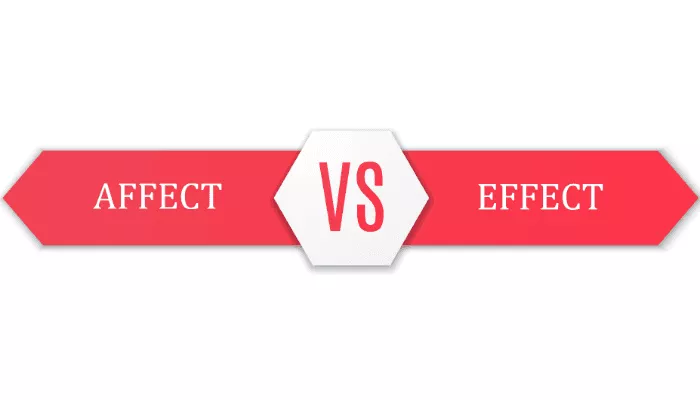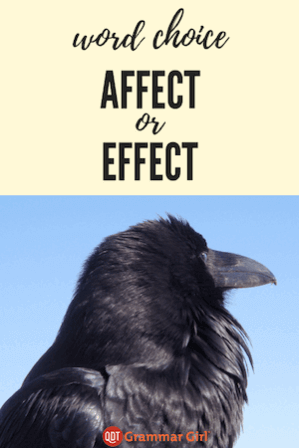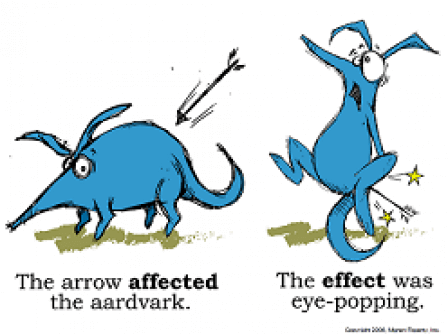I get asked whether to use affect or effect all the time, and it is by far the most requested grammar topic, so I have a few memory tricks to help you remember. Before we get to the memory trick though, I want to explain the difference between the two words.
What Is the Difference Between ‘Affect’ and ‘Effect’?
The majority of the time you use affect as a verb and effect as a noun. Affect can either mean “to influence” or “to act in a way that you don’t feel.” Effect typically means “a result.”
‘Affect’ and ‘Effect’ Are Pronounced Differently
The words sound the same to a lot of people, but there is actually a small difference in how they are pronounced.
Effect is pronounced [ih-fekt], almost like it has an I-sound at the beginning.
The main way affect is pronounced is [uh-fekt], more like it has an A-sound at the beginning.
When Should You Use ‘Affect’?
Affect with an a means “to influence,” as in, The arrows affected Aardvark, or The rain affected Amy’s hairdo. Affect can also mean, roughly, “to act in a way that you don’t feel,” as in, She affected an air of superiority.
When Should You Use”Effect’?
Effect has a lot of subtle meanings as a noun, but to me the meaning “a result” seems to be at the core of all the definitions. For example, you can say, “The effect was eye-popping,” or “The sound effects were amazing,” or “The rain had no effect on Amy’s hairdo.”
‘Affect’ vs. ‘Effect’ Example Sentences
Here are more examples of the common uses of affect and effect:
Effect as a noun
Squiggly marveled at the effect fishing had on Aardvark’s mood.
Aardvark wondered whether the heat was having an effect on the fish.
Affect as a verb
Squiggly wished that beans didn’t affect his stomach so much.
Aardvark’s grumpiness affected everyone else’s mood last night.
‘Affect’ vs. ‘Effect’: Common Uses
Most of the time, affect is a verb and effect is a noun.
There are rare instances where the roles are switched, and I’ll get to those later, but for now let’s focus on the common meanings. This is “Quick and Dirty” grammar, and my impression from your questions is that most people have trouble remembering the basic rules of when to use these words, so if you stick with those, you’ll be right about 95% of the time.
Most of the time, affect is a verb, and effect is a noun; and now we can get to the memory tricks and more examples,
‘Affect’ vs. ‘Effect’: The RAVEN Trick
I remember how to use affect and effect by thinking of a big black raven. A raven? Yes, a raven! Because raven has the letters A-V-E-N in it, and those also stand for
Affect: Verb Effect: Noun
Fix that image of a raven in your mind, and you’ll always remember the most common way to use these words. I actually remember the sentence The craven raven flew down the avenue, because craven, raven, and avenue all have the A-V-E-N sequence, and in my mind, the evil raven is flying down the avenue of a German town with those timbered white Bavarian-style houses. I don’t know why. I have a wild imagination. Find yours, and really imagine that affect-verb-effect-noun raven so you’ll always remember it.
Once people remember the RAVEN trick, they often ask for tips to figure out whether the word they’re trying to use is a noun or a verb. Do I have some? Of course, I do!
Verbs Are Actions, and ‘Action’ Starts with A
Verbs are often actions, and the word action starts with the letter A, just like the verb affect. If the word you want describes an action, then you want the word that starts with an A—affect.
See if you can substitute another verb for the word you want. Here’s an example. If your sentence is The arrows affected Aardvark, you can tell that affected is a verb first because it can become past tense by adding -ed (nouns don’t do that), and second because you can substitute other verbs such as hurt, poked, and hit:
The arrows affected Aardvark.
The arrows hurt Aardvark.
The arrows poked Aardvark.
The arrows hit Aardvark.
Alternatives to ‘Affect,’ the Verb
The verb affect is vague, and when people don’t know whether to use affect or effect, sometimes they use impact instead, which besides having problems of its own, is also vague. When you’re thinking about using either of those words, see if you can use a better verb, a more specific verb, instead.
Here’s an example: Maybe you’re trying to write something like
The weather affected Aardvark’s holiday plans.
What does affected really mean in that sentence? It’s better to be more specific, and write something like
The weather ruined Aardvark’s holiday plans.
Now you know what really happened, not just that the plans were affected, somehow changed, but they were changed in a bad way—they were ruined.
Now let’s move on effect, the noun.
Nouns Can Take an Article Such as ‘The’
Remember how we knew that affect was a verb because we could make it past tense with the -ed ending, and that’s something we can’t do to nouns? Well, nouns also have their own special feature: You can put a grammatical article, such as the, in front of a noun, and you can’t put one in front of a verb.
Here’s an example:
The effect was eye-popping.
Notice that I said “the effect.” The word has an article before it, so it’s a noun. You can remember that by noting that the word the ends with E and the noun effect starts with E, so if you can butt those two E’s up against each other, you have a noun.
Sometimes the article could be an, as in
Squiggly wondered whether the news would have an effect on Aardvark.
and sometimes there could be an adjective between the article and the noun like the word special in this sentence:
Squiggly marveled at the special effects in the movie.
Nouns won’t always have the word the right in front of them. That’s not the point. The point is COULD you put the word the in front of it and have the sentence still sound mostly OK? If you could, it’s a noun. For example, you could change those last two sentences so that the is right before effect like this:
Squiggly marveled at the effects in the movie.
Squiggly wondered whether the news would have the effect on Aardvark.
That last one sounded kind of weird, but it didn’t sound ungrammatical. It makes some kind of sense. But if you try to put the in front of a verb, it just doesn’t work:
The weather the affected Aardvark’s holiday plans? (That just sounds wrong.)
The arrows the affect Aardvark. (That just sounds wrong too, because affect is a verb in that sentence and you can’t modify verbs with articles. Only nouns, like effect, can take an article.)
Those are the basics! RAVEN helps you remember affect-verb-effect-noun, and you know how to tell the difference between verbs and nouns. But what about those exceptions I mentioned at the beginning.
If the rule is affect-verb-effect-noun 95% of the time, what about the other 5%?
‘Affect’ vs. ‘Effect’: The Exceptions
Affect can be used as a noun when you’re talking about psychology–it means the mood that someone appears to have. For example, if you say, “Squiggly displayed a happy affect,” it means Squiggly looks happy, but we don’t really know whether he feels happy. Psychologists find it useful because they know that you can never really understand what someone else is feeling. You can only know how they appear to be feeling.
Notice that I pronounced the word differently. When it’s a noun this way, it’s pronounced [af-ekt].
Effect can be used as a verb that essentially means “to bring about,” or “to accomplish,” and you’re most likely to see it in the phrase effect change. For example, you could say, “Aardvark hoped to effect change in the village.”
And in my mind, it’s that German village again. Whole circle fullness! I hope my RAVEN trick helps you remember the difference between affect and effect forever.
Administrative
Follow Grammar Girl on Facebook or Twitter.
Free Download of the “Dirty Words” Chapter From Grammar Girl’s Book
Affect versus effect is just one of the many confusing word choices that Mignon Fogarty covers in the “Dirty Words” chapter of her New York Times best-seller, Grammar Girl’s Quick and Dirty Tips for Better Writing. You can download the chapter by clicking hereopens PDF file .
You can order a copy of the paperback edition from any of these online retailers or pick one up at your favorite bookstore:
The book is also available in an e-book edition. You can download a copy wherever e-books are sold.
Raven image courtesy of Shutterstock.
This article was originally published July 29, 2008 and updated July 4, 2016.






